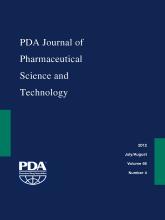Abstract
The general compatibility between various polymers (plastic and elastomeric materials) commonly used in medical devices (e.g., syringes) and common solution-based pharmaceutical products was examined. Processes affecting material/solution compatibility that were considered included drug binding and material leaching. Considering binding, material/water equilibrium binding constants (Eb) were determined for 14 organic solutes and the test materials. Correlations between the measured binding constants and the organic solute's octanol/water and hexane/water partition coefficients were obtained. In general, the elastomeric materials behaved similarly and interacted with acidic compounds differently than with neutral compounds. Alternatively, the plastic materials typically used in device components such as syringe barrels were relatively inert in the sense that they only minimally bound even the most lipophilc compounds. Considering leaching, both organic entities and trace elements/metals were extracted from the elastomers over the extraction pH range investigated. The plastic materials generally had lesser quantities of organic leachables than did the elastomers and contained little, if any, extractable trace elements/metals.
LAY ABSTRACT: Polymeric materials are commonly used in medical devices such as syringes. The plastic materials may interact with drug products contained within the device, potentially affecting the quality of the drug products. These interactions may include leaching, which is the migration of entities out of the material and into the drug product, and binding, which is the migration of substances out of the drug product and into the material. This paper examines the magnitude of leaching and binding for several materials that can be used in syringe parts such as the syringe barrel, plunger, and tip cap.
- © PDA, Inc. 2012
PDA members receive access to all articles published in the current year and previous volume year. Institutional subscribers received access to all content. Log in below to receive access to this article if you are either of these.
If you are neither or you are a PDA member trying to access an article outside of your membership license, then you must purchase access to this article (below). If you do not have a username or password for JPST, you will be required to create an account prior to purchasing.
Full issue PDFs are for PDA members only.
Note to pda.org users
The PDA and PDA bookstore websites (www.pda.org and www.pda.org/bookstore) are separate websites from the PDA JPST website. When you first join PDA, your initial UserID and Password are sent to HighWirePress to create your PDA JPST account. Subsequent UserrID and Password changes required at the PDA websites will not pass on to PDA JPST and vice versa. If you forget your PDA JPST UserID and/or Password, you can request help to retrieve UserID and reset Password below.






